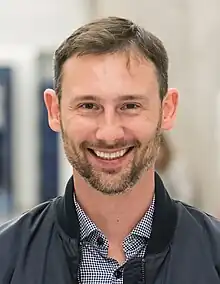Sławosz Uznański
Sławosz Uznański (Polish: [ˈswavɔʂ uzˈnaɲskʲi]; born 12 April 1984 in Łódź) is a Polish engineer working at European Space Agency (ESA) as project astronaut since 2023 and formerly at CERN.
Sławosz Uznański | |
|---|---|
 Uznański in 2023 | |
| Born | 12 April 1984 Łódź, Poland |
| Education | University of Nantes |
| Alma mater | Łódź University of Technology |
| Scientific career | |
| Fields | engineering |
| Institutions | European Organization for Nuclear Research (CERN) European Space Agency |
Early life and education
Uznański was born and raised in Łódź, where he attended the 8th Adam Asnyk High School. In 2008, he graduated with honours with master's degree from the Technical University of Łódź and from the University of Nantes; in the same year also received Diplôme d'Ingénieur from the Polytech Nantes.[1] In 2011, he received a doctor's degree with distinction from the University of the Mediterranean Aix-Marseille II for thesis on radiation-tolerant designs for space applications.[2]
Career
During his doctorate, he worked at STMicroelectronics manufacturing facility in Crolles, France.
In 2011, he joined the European Organization for Nuclear Research (CERN) in Geneva, Switzerland. In 2013, he was appointed as a project lead and senior reliability engineer at CERN. From 2018 to 2020, he was an Engineer in Charge of Large Hadron Collider.
In 2019, he was a technical expert and reviewer for Horizon 2020 programme; investigating European autonomy and technological competitiveness in the space industry for European Research Executive Agency (REA).
In November 2022, he was announced as a reserve astronaut by the European Astronaut Corps for the 2022 European Space Agency Astronaut Group.[3]
In August 2023, Polish Development and Technology Minister, Waldemar Buda, announced that a Polish astronaut would fly to the International Space Station (ISS) in 2024, adding that if the mission goes ahead Poland will submit the candidature of Uznański which will have to be approved by ESA and American company Axiom Space. If Uznański is accepted, he will become the second Pole to go into space after Mirosław Hermaszewski in 1978.[4]
He joined ESA to undergo his training for the mission on 1 September 2023.[5]
References
- "ESA - Sławosz Uznański". European Space Agency. Retrieved 2023-07-03.
- "Sławosz Uznański biografia - POLSA - Polska Agencja Kosmiczna". Polish Space Agency. Retrieved 2023-07-03.
- Paola Catapano (2022-11-25). "From CERN to space: staff member selected to join the ESA 2022 astronaut class". CERN. Retrieved 2023-07-03.
- "Polish astronaut to become second ever Pole to go into space". thefirstnews.com. 9 August 2023. Retrieved 13 August 2023.
- "Sławosz Uznański from Poland to train as a project astronaut at the European Astronaut Centre". European Space Agency. 2023-09-07. Retrieved 2023-09-07.